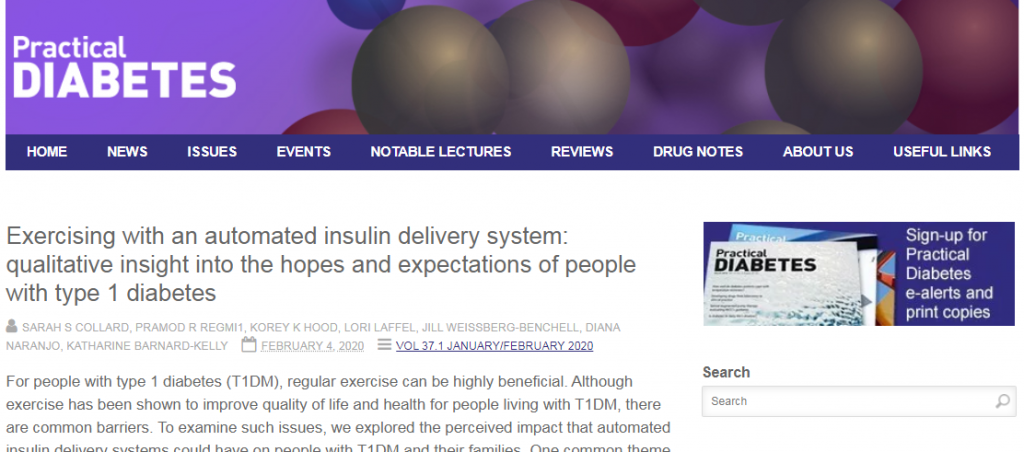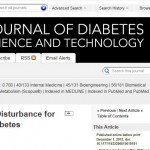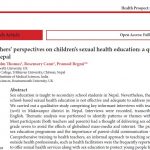Congratulations to Dr. Sarah Collard in the Department of Psychology, Dr. Pramod Regmi in the Department of Nursing Science and FHSS Visiting Professor Katherine Barnard-Kelly on their publication: ‘Exercising with an automated insulin delivery system: qualitative insight into the hopes and expectations of people with type 1 diabetes’ [1]. This paper in Practical Diabetes is a joint publication with several North American scholars.
 The authors of this qualitative paper distilled three themes related to the benefits of automated insulin delivery systems: (a) more freedom and spontaneity in the individual’s ability to exercise; (b) relief
The authors of this qualitative paper distilled three themes related to the benefits of automated insulin delivery systems: (a) more freedom and spontaneity in the individual’s ability to exercise; (b) relief
from worry of hypoglycaemia as a result of exercise; (c) removing the ‘guesswork’ of adjusting insulin for exercise, as well as two further themes relating to potential concerns with regard to safely exercising while wearing an automated insulin delivery system.
Well done!
Prof. Edwin van Teijlingen
CMMPH
Reference:
- Collard, S.S., Regmi, P.R., Hood, K.K., Laffel, L., Weissberg-Benchell, J., Naranjo, D., Barnard-Kelly, K. (2020) Exercising with an automated insulin delivery system: qualitative insight into the hopes and expectations of people with type 1 diabetes, Practical Diabetes 2020; 37(1): 19–23
 Three successful cross-faculty Health-Psychology collaborations
Three successful cross-faculty Health-Psychology collaborations Hat-trick of new diabetes papers
Hat-trick of new diabetes papers Congratulations to Dr. Pramod Regmi
Congratulations to Dr. Pramod Regmi New collaborative Nepal paper
New collaborative Nepal paper










 SPROUT: From Sustainable Research to Sustainable Research Lives
SPROUT: From Sustainable Research to Sustainable Research Lives BRIAN upgrade and new look
BRIAN upgrade and new look Seeing the fruits of your labour in Bangladesh
Seeing the fruits of your labour in Bangladesh Exploring Embodied Research: Body Map Storytelling Workshop & Research Seminar
Exploring Embodied Research: Body Map Storytelling Workshop & Research Seminar Marking a Milestone: The Swash Channel Wreck Book Launch
Marking a Milestone: The Swash Channel Wreck Book Launch ECR Funding Open Call: Research Culture & Community Grant – Application Deadline Friday 12 December
ECR Funding Open Call: Research Culture & Community Grant – Application Deadline Friday 12 December MSCA Postdoctoral Fellowships 2025 Call
MSCA Postdoctoral Fellowships 2025 Call ERC Advanced Grant 2025 Webinar
ERC Advanced Grant 2025 Webinar Update on UKRO services
Update on UKRO services European research project exploring use of ‘virtual twins’ to better manage metabolic associated fatty liver disease
European research project exploring use of ‘virtual twins’ to better manage metabolic associated fatty liver disease